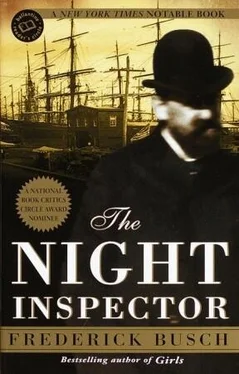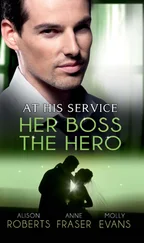“You see,” I said, “that is what The Whale was, I maintain: a critique of the philosophy of numbers.”
“You’re a watchful man, Mr. Bartholomew.”
“No — won’t you call me Billy?”
“Call me Herman,” he said.
“An honor.”
“And likewise. But may I ask you, Billy, about your …”
“Face.”
“Exactly that. Yes. Was it the War?”
“It was the War. The interests of money and the will of our Commander decreed it. Battle for the rights of the industrialists, battle for the rights of the agriculturists, battle on behalf of bullyrag Abe, who saw himself, I insist, as the issue: my will, my national entity, my idea of indivisibility. Crush the farmboys and the desperate Negroes into one another with a thunderclap. And see to it — be sure! — that one William Bartholomew receive the national hoofprint in his head. I’m a coin imprinted with Abe’s earnestness.”
He shook his head and permitted me to pour him more of Cheerie’s sour wine. “I cannot reprove your bitterness,” he said. “I know its taste. Though I believe the righteousness of the President’s motives. You cannot start a nation and permit it to founder. The experiment is too holy, too vast. And the black slaves? What of them, Billy?”
“Engines of economy. It was money was the prize.”
“Poor man,” he said. Then: “I meant that of all men, not you, you understand.”
“Poor man,” I replied.
“You were struck with a minié ball? May I ask?”
“I saw my fellowman countless times, with a devastating insight. Twice, and once with devastation equal to that which I dispensed, he saw me in return.”
He gazed and gazed, but I gave him nothing more. He dropped his red-rimmed eyes.
“Tell me,” I said, “of that extraordinary moment when your Ishmael feels the hands of the other men as they squeeze the sperm of the killed whale on board their ship. It was an instant of brotherhood surpassing the interests of money, was it not? And would your man not feel a great sorrow, given his great gloom? Would he not sense, having felt the hand of brotherhood, that they were soon to lose hold of one another?”
“You have read the book,” he answered, nodding slowly, permitting himself a smile. “You have studied it. Yet I must wonder: Have I written as much of economic matters as you seem to suggest? Did I not speak of the beef-and-ale of those actual men? And about the fishiness of the fishes? The brine of their sea? I did intend to. And, surely, I was intent, I can tell you, upon capturing — well, suggesting, at any rate, rendering as well as I could, the superb high will of Ahab. His shuddering desire to be dignified under heaven — under heaven’s oppression.” His hands moved with precision upon the surface of the table, though in service of exactly what I could not tell, at first. He arranged, as he spoke, the angles of cutlery to glass, of nappery to butter dish. His body seemed to seek the exactness of purpose about which he spoke. I realized then that he wanted — he was yearning — to write on paper with a pen. “I have some poems,” he said.
“Would I dare to venture a request?”
“Perhaps we’d dine again,” he said.
“And you might bring one?”
“Several,” he said. “If you’re willing, why flee from a reader?”
I wore the mask when I left, and, underneath its absurd slight smile, an arrangement of pasteboard and varnish and paint, what was left of my mouth stretched involuntarily to imitate his own uneasy smile.
On certain days in Manhattan, say in the Five Points, when I am passing the open drains that fester not that far from the communal pump, when the weather lays itself upon us, sealing the island beneath it as a cork in the top of a glass bottle, and nothing rises very far from the cobbles or mud — not steam from the manufactories, nor the stench of leather in tanneries, nor bowels of cattle slaughtered while they scream, nor the muggy dews of unsoaped flesh packed dozens in every room at the Old Brewery building — then I think of the smoke that choked Charleston. Stink was everywhere. I carry, behind the ruins of my face, inside my brain, the smell of excrement and pounded, flayed flesh stirred deep into the mud of the streets, the composted stench of decaying scrip and bank drafts and certificates of mortgage in the civil registry, and in the merchants’ bank, and of course the bitter, corrosive wash against my bandages of shingle, lath, and floorboard as they burned. It was a time of odors. You could smell the putrefaction of wounds. You could smell the maggots in them, like the bitter, herbal smell of bats. The unbathed men, the starved, exhausted horses and mules, the shallow breathing of a vast despair — you could smell the staggered nation, now entire again as the President would have it, and the perfumed men of industry and capital and confidence, one of whom I vowed to become. Some of us with faces could be seen to smile. And on certain days in Manhattan, say in the Five Points, I, with my little carved mouth hole set below the excellent painting of a face — lashes drawn above the eyeholes, breathing holes under the handsome, Saxon nose, all of it on the pinkish-white face paint that shines with its protective lacquer — I smiled, too, because I so wished that I might mean to. I was always grateful for a falling barometer, and the fog from off the Battery, because I was not, I knew, a gladsome sight.
I had come, unseeing, through Charleston on my way back up to Washington. That was where they nursed me in spite of my cowardly begging, my tearing at the bandages with which they wound my head and covered my face. I ought to have bled to death, and I hoped to, and I failed.
“Have the goodness,” I told the woman who volunteered to bathe the remains of my face in glycerine water, “have the cordial generosity, the sisterly affection, I beg you, Madame, to leave me be.”
“Have the decency,” she replied, with her memorable inability to say the letters r and l as anything other than w , “to reward my efforts and the surgeons’ with your silence and your courage.”
“It is my choice to live or die,” I said. I should not say said. I whimpered, I believe. I hoped that someone might end me, although I could not say so outright. My head burned from within, like one of the ruined manorial houses, all roasted black shell and sullen embers, which I had seen before the hunters took me down.
“There is no more choice, sir,” she said as if in tears. I could not see her. She had a husky voice and a cultured manner. “Choice is irrelevant. Henceforth, we may live with much, though with less than before. And not, I believe, with choice. If I may say.”
I did not see her face for weeks. I thought, often, of strangling her, and, equally, of wedding her, the better to serve her unto death. I did not know her name. She refused to give it. I became tumescent, on her account, for the first time in months. I thought to see to myself, glowing like a stove inside my bandages and beneath the coarse hospital blanket.
“It’s daylight,” a man on a nearby cot said hoarsely. His voice was equal parts pity, contempt, and embarrassment.
“In here,” I told him, “it’s night.”
“To the bald-headed hermit,” he replied, “the time is always night. But I thought you’d want to know it’s late afternoon, and your blanket gives an appearance of being crowded and violent.”
“My thanks for the tip.”
“No, sir,” he said. “The tip, the shaft, the bollocks and all are wholly your affair. My sole concern is to convince myself that no wrist aches beneath the arm they cut away. I thought it right to warn you for dignity’s sake.”
Читать дальше












